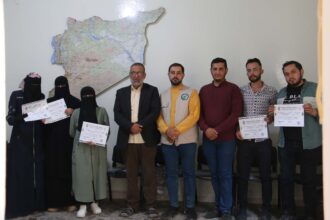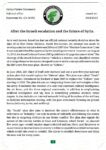The New Syrian Administration: Between External Assurances and Neglecting Internal Discourse

Syria witnessed a radical transformation after the fall of Bashar al-Assad’s regime in December 2024, as the new administration took charge of the country during a transitional phase filled with challenges.
At the beginning of this new era, the administration prioritized strengthening foreign relations and gaining international recognition, while the internal discourse addressing the Syrian people received less attention.
Focus on External Assurances:
From its first day in power, the new Syrian administration moved swiftly to strengthen its relations with regional and international states. Damascus welcomed diplomatic delegations from various countries, including the U.S., Saudi Arabia, Turkey, France, and Germany, as well as representatives from the United Nations and the European Union.
These visits aimed to extract assurances from Damascus regarding the new administration’s commitment to stability and building a new Syria free from the policies of the previous regime, including issues of revenge and retribution.
Additionally, the new Syrian president, Ahmad Al-Shar’, engaged in intensive communications with Arab and global leaders. He visited Saudi Arabia and Turkey in February 2025, discussing ways to support Syria in its reconstruction and stabilization phase.
Undoubtedly, these steps reflect the administration’s efforts to gain international legitimacy and lift the economic sanctions imposed on the country.
Neglecting Internal Discourse:
Conversely, there is a noticeable decline in the new administration’s attention to internal discourse directed at the Syrian people.
After more than a decade of war and suffering, Syrians are looking for tangible reforms in security, the economy, and essential services. However, the new administration has yet to present a clear vision or detailed plans to address these issues, leading to widespread dissatisfaction among citizens.
For instance, despite announcing the formation of a preparatory committee for a comprehensive national conference, the scheduled dates for this event have been repeatedly postponed, raising doubts about the administration’s seriousness in involving all segments of Syrian society in shaping the country’s future.
Although the announcement of the preparatory committee included a press meeting—an arguably positive step—it failed to outline a clear timeframe for its work.
Additionally, the administration has not provided quick solutions for the electricity and water crises; on the contrary, the situation has worsened, exacerbating Syrians’ suffering despite promises to improve services within a few months.
Manifestations of the Disparity Between External and Internal Discourse:
- Intensive Diplomatic Visits: Within just two months, Damascus received delegations from over 17 countries, including Gulf Cooperation Council states and the European Union, while no public meetings or open dialogues were held with Syrian citizens.
- Postponement of the National Conference: The administration announced the postponement of the national conference, which was supposed to serve as a platform for dialogue among all Syrian factions. Additionally, the preparatory committee was selectively formed, reflecting a prioritization of foreign relations over internal dialogue.
- Lack of Economic Reforms: Despite international calls for lifting sanctions, the new administration has yet to present clear economic plans to address poverty and unemployment, which affect more than 90% of Syrians.
Core Reasons:
Many speculations surround the motives of the new Syrian leadership, especially after the appointment of Ahmed Al-Shara‘ as president during the transitional phase. Among them:
- Foreign Investments: Despite the partial lifting of sanctions, the new Syrian leadership has struggled to attract sufficient investments to boost the domestic economy, leading to a greater focus on external investments.
- Security Challenges: The new leadership has faced significant challenges in dealing with remnants of the former regime and other armed groups, resulting in a strong emphasis on both internal and external security, given the interconnected nature of domestic and foreign developments.
However, the most significant underlying reason appears to be the new Syrian leadership’s clear strategic vision: that internal actors, whether positive or negative, do not pose a real threat to the new state.
The positive actors support the leadership in its course, while the negative actors are seen as linked to external backers. Therefore, engaging with them is perceived as a waste of time and an unnecessary distraction.
Thus, the Syrian leadership views all internal issues as solvable only by changing the perceptions of regional and international powers.
For instance, the economy relies on two key factors:
- Lifting sanctions completely, which can only be achieved through the international community (the U.S., Europe, and the UN Security Council).
- Foreign investments, which refrain from entering Syrian sectors due to concerns from the international community—not because of internal security issues, as stability has been firmly established.
As for the failure of internal actors to obstruct the course and project of the Syrian leadership, this will be resolved once external support for them is cut off.
For example, the Syrian Democratic Forces (SDF), if U.S. support is halted and the Russian umbrella is frozen, will face either confrontation with Turkish forces and their allies or the option of integrating into the Syrian leadership’s project by joining the Syrian state, which is offering significant facilitations and reassurances to the Kurdish community.
Regarding the forces in southern Syria, the visit of Foreign Minister As’ad Al-Shibani to the United Arab Emirates and his meeting with his Emirati counterpart, Abdullah bin Zayed Al Nahyan, yesterday on the sidelines of the “World Government Summit” in Dubai aimed to ensure the withdrawal of Emirati support for any movements opposing the Syrian leadership. Reports were promising, indicating that the Emirati side was convinced that their interests align with the state project in Syria, which could also persuade the Israeli side that instability would be costly for both Syria and Israel.
Thus, the mindset of the new leadership can be understood—it appears to be a pragmatic approach to laying the foundation for the Third Syrian Republic.
However, given the significant challenges facing Syria, the new administration must strike a balance between strengthening foreign relations and building trust with the Syrian people.
While international reassurances are essential for lifting sanctions and attracting investments, neglecting internal discourse may exacerbate public discontent and threaten internal stability.
Therefore, the new administration must prioritize addressing citizens’ needs and presenting a clear vision for the country’s future alongside its efforts to enhance international relations.
Accordingly, we in the Political Bureau of the Syrian Future Movement recommend the following:
- There must be transparency between the state and the people, particularly at the ministerial level. Each ministry should provide weekly clarifications of its work through official statements or press briefings that outline challenges, present visions, and specify steps forward.
- The state should actively seek assistance from Syrians both inside and outside the country, whether in the form of advisory support or material aid. When a newly emerging state believes in its people, and when its people are deeply embedded in international institutions—as is the case with the Syrian people—it becomes imperative for the state to mobilize its citizens and create avenues for their contributions. This ensures that domestic priorities are not neglected in favor of foreign relations, nor vice versa.
- Every institution should develop an official plan and file, along with a public communication channel, to encourage citizen participation in providing both theoretical and practical solutions. This could be done through a dedicated email or a specialized liaison committee.
There is no doubt that the situation is complex, optimism is high, and external challenges are immense. However, internal challenges are equally significant and must not be neglected but rather addressed with the same level of commitment.
Political Office
Research Team
Research and Studies Department
Articles
Syrian Future Movement






